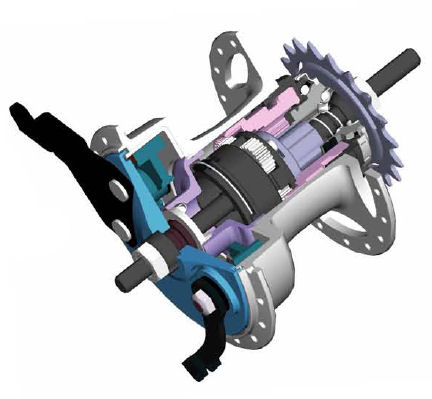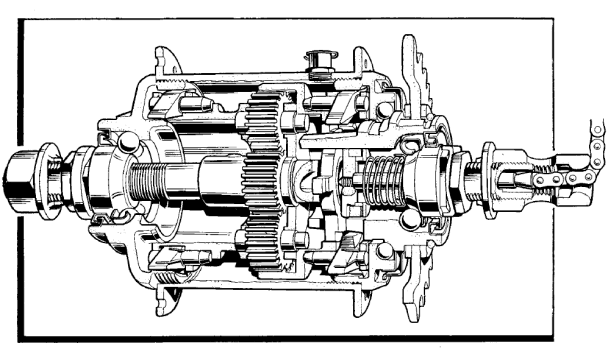Wartung von Sturmey-Archer Drei-Gang-Naben
Ein anderer Artikel deckt Wartungsfragen ab, die auf Drei-Gang-Naben als auch andere Sturmey-Archer-Naben zutreffen. Besonders interessant dürften die Abschnitte zu folgenden Themen sein:
- Ersetzen der Züge
- Einstellen der Züge
- Einstellen der Konen
- Sicherungsscheiben
- Achslängen
- Schmierung
Man sollte jenen Artikel im Zusammenhang mit diesem Artikel hier gelesen haben.
Es gibt weitere Artikel, die folgende Theman abdecken:
- Alles über Nabenschaltungen
- Sturmey-Archer Naben
- Demontage von Sturmey-Archer Naben
- Wartung der Sturmey-Archer Dynohub und AG Nabe
- Verwendung und Wartung von Sturmey-Archer Schaltungsnaben
- Sturmey-Archer Teile und Namen
- Modell und Produktionsjahrbestimmung von Sturmey-Archer Nabenschaltungen
Übersetzungen
Die üblichen Sturmey-Archer Drei-Gang-Naben haben im mittleren Gang eine direkte Übersetzung (1:1), im höchsten Gang 4/3 der direkten Übersetzung und im unteren Gang 3/4 des mittleren Gangs. Das Prinzip, die das erreicht wird, wird in einem anderen Artikel erläutert. Unter anderen aktuellen Naben ab 2010 ist die S3X Fixed-Gear Nabe abweichend zu dieser allgemeinen Aussage. Sie hat zwei nah unten abgestufte Gänge und eine direkte Übersetzung im höchsten Gang. Zudem gibt es noch eine spezielle Nabe für Brompton, die eine breitere Übersetzung hat und mit zwei Ritzeln und einem Schaltwerk insgesamt sechs Gänge hat.
Nach modernen Maßstäben ist das typische englische Drei-Gang-Fahrrad recht hoch übersetzt. Die meisten haben eine 48/18 Kettenblatt/Ritzel Kombination mit einem Vortriebsverhältnis von 3,83, 5,11 und 6,81 (Entfaltung von 4,00, 5,28 und 7,12 Metern). Hier kann man das Fahren etwas vereinfachen, indem man die Kettenblatt/Ritzel-Kombination anpasst. 20er oder 22er Ritzel sind leicht zu bekommen. Genauso kann man auch kleinere Ritzel erwerben, wenn man ein Geschwindigkeitsfetischist ist oder ein Fahrrad mit kleinen Laufrädern hat. Auch kann man sich ein Shimano Ritzel mit einem Dremel anpassen, wenn man ein noch größeres Ritzel fahren möchte. Das ist nicht besonders schwierig und wird im Artikel Alles über Nabenschaltungen erläutert.
Sturmey-Archer hat viele Modelle der Drei-Gang-Nabe über die letzten Jahrzehnte entwickelt.
Dokumentation aktueller und moderner Sturmey-Archer Drei-Gang-Naben
Sturmey-Archer has the widest surrent selection of three-speed hubs of any manufacturer. Most have aluminum shells, and are relatively light compared with hubs of other brands. The information below is compiled from a review of the Sturmey-Archer Web site, Sturmey-Archer catalogs, and a Web search. Technical information is available for most, but not all, current Sturmey-Archer 3-speed hubs. The newest three-speed coaster-brake hubs have been added to the comparative parts lists in Sutherland's Handbook of Internally Geared and Coaster Brake Hubs, now online on this site.
Rows with yellow backgrounds in the table below are for hubs which are lsted in both the 2010 and 2015 catalogs. Links in the "Model" column will take you to Sturmey-Archer's page about the hub. Rows with green backgrounds are for hubs new since 2010. Rows with white backgrounds are for "ghost" hubs -- no longer sold, not in the 2015 catalog, and parts may no longer be available. On the other hand, many parts lists are available which were not in 2010, listed in the Documentation column.
- Siehe auch
- Specifications
- Fitting Sets (for most hubs -- unless indicated in individual entries)
- A site with information on several hubs
- Another site with information on several hubs
Model Features Documentation AB3 90 mm drum brake, steel shell Like SAB3; Also see AB/C. AB/C 90 mm drum brake, steel shell Technical information. Another source Internals like S-RF3. Installation and parts list. AW No Intermediate Gear version -- not the classic AW. Steel shell.
Technical info Parts list AWC Coaster brake, steel shell Technical information Rebuilding instructions and comparative parts list, in Sutherland's AWC 2003-2005 Coaster brake, steel shell -- slight modification of the earlier version Technical informationAnother source Rebuilding instructions and comparative parts list, in Sutherland's AWC(II) Coaster brake, steel shell -- slight modification of the earlier version. Same as S-RC3(II) except for the shell.
Technical information Another source Parts list Rebuilding instructions and comparative parts list, in Sutherland's BWR Special Brompton extra wide-ratio 3-speed used with 2 sprockets and a rear derailer to make a 6-speed hybrid-gearing system. This hub is apparently sold only through Brompton.
Procedure is the same as for the S-RF3; driver and planet cage assembly are different.
Video of disassembly/reassembly on Brompton site (requires that you establish a login).
Video of disassembly-reassembly, narration is in French but you should be able to follow this anyway. CS-RF3 Splines for cassette (hybrid gearing)
Installation Fittings Parts list CS-RK3 Splines for cassette (hybrid gearing) disc-brake fitting
Installation Fittings Parts list QS-RC3 Gearbox for tricycle. Has reverse gear and coaster brake.
Installation Parts list RS-RB3 Rotary shifting. Band brake fitting, could be used for drive sprocket
Installation Fittings Parts list RS-RF3 Rotary shifting
Installation Fittings Parts list RS-RK3 Rotary shifting, disc brake fitting
Installation Fittings Parts list RX-RD3 Rotary shifting, drum brake.
Installation Fittings Parts list S3X Fixed gear
Installation Fittings Parts list SAB3 70 mm drum brake Parts list; like AB3 S-RC3(II) Coaster brake. This is the same as the AWC(II) except that the shell is of aluminum..
Technical information Parts list Rebuilding instructions and comparative parts list, in Sutherland's S-RF3 3-spline driver Technical information,, rebuilding Parts list Another source S-RF3 (N) 9-spline driver Probably like S-RF3 S-RK3 Brake disk fitting, 3-spline driver Parts list S-RK3 (N) Brake disk fitting, 9-spline driver Probably like S-RF3 SX-RB3 Wide body (chainline 65-69 mm), band-brake (threaded) fitting Parts list SX-RK3 Wide body (chainline 65-69 mm), brake-disk fitting Parts list TS-RB3 Gearbox for tricycle. Threading for band brake at left side
Installation (but no reverse gear) Parts list TS-RC3 Gearbox for tricycle. Coaster brake
Installation (but no reverse gear) Parts list TS-RF3 Gearbox for tricycle. Has reverse gear.
Installation Parts list X-RD3 70 mm drum brake Technical information Another source Yet another Parts list (says XL-RD3) XL-RD3 90 mm drum brake Like X-RD3; Installation Parts list
Ältere Sturmey-Archer Drei-Gang-Naben
Old English Almost all English 3-speeds have Sturmey-Archer rear hubs. The classic Sturmey-Archer AW hub is by far the most common model. It is quite easy to overhaul with these instructions. Parts for the classic AW are available from Harris Cyclery, and this hub is so common that parts can often be cannibalized from discarded wheels. (The current No Intermediate Gear version of the hub is not the old AW. It is mostly the same as the S-RF3 hub except for its steel shell.)
There have been several licensed and unlicensed copies of the AW: Brampton, Hercules, Scintilla, Steyr, SunTour, Vibo. Most parts are interchangeable.
The table below covers the more common older hubs and a few others of interest. It omits specialty narrow-ratio hubs and hubs discontinued before 1940. Old Sturmey-Archer three-speeds other than the AW and closely-related models (AG, AB) can be tricky or impossible to repair, due to parts un-availability.
Sturmey-Archer changed its parts numbering system sometime around 1950. Older parts numbers begin with the letter K and newer ones, with H. If the model of the hub is the same, and the description of the part is the same, the part is almost always the same, despite the different numbering. Some of the classic references linked below use the "K" parts numbers. Sutherland's Handbook of Coaster Brake and Internally-Geared Hubs uses the newer part numbers.
Older internal parts with a gray finish are reportedly more durable than newer ones with a black finish, due to a better surface-hardening treatment which had to be discontinued for environmental reasons.
The AW's internals will fit into many Sturmey-Archer hub shells of the same era, making it possible to keep a wheel in service. One exception is that the left ball cup of many if not all four- and five-speed hubs lacks an inner flange to center the planet cage. Sturmey-Archer historian Tony Hadland reports that 1984- and later steel AW shells will not accept S5 internals. Coaster-brake and drum-brake shells will not fit the AW.
Older Sturmey-Archer coaster-brake hubs have safety issues: The brake of the TCW and S3C was actuated through the gear train, so it was weakest in high gear, when the bicyclist was going fastest! The TCW could lose the brake entirely if the cable was misadjusted, due to the neutral-gear position between second and third,. The AW and its near relatives also have a neutral gear, and if the cable is misadjusted, these hubs can drop out of gear. Jobst Brandt has, in addition, described a tendency of these hubs to slip out of high gear into neutral in a hard sprint -- though this problem does not occur under more usual conditions of use. See comments on this topic by Brandt.
The Web sites linked below the table cover many additional older hubs. The Sturmey-Archer Heritage Web site has a wealth of historical and technical information. Tony Hadland's Web site includes an exploded drawing and parts list for nearly every Sturmey-Archer model up through 2001, as well as rebuilding information for many older hubs. Documentation on the older hubs is actually better than on current ones.
Model
Year Introduced
Features
Documentation
in Boldface if on this site
AB 1938 90 mm drum brake Parts list and instructions
Another source
Parts list
AG 1946 Dynohub generator Rebuilding instructions
Another source
Parts list
ASC 1946 Fixed gear Rebuilding instructions
Another source
Parts list
AT3 Elite 1984 Drum brake, aluminum shell, no intermediate gear. Internals same as the SAB Technical information
Parts list
AW 1936 The classic but can slip into neutral! not the same as the current no-intermediate-gear version. Rebuilding instructions and comparative parts list, in Sutherland's
Rebuilding instructions
Technical info
Parts list and exploded drawing
Later version of instructions
AW-Columbia 1984 Columbia "no slip" three-speed Parts list, exploded diagram
Another source
AW Alloy 1983 Three-speed, aluminum alloy shell Rebuilding instructions and comparative parts list, in Sutherland's
Technical info
Parts list
S3B 1967 Small-diameter drum brake Parts list and exploded diagram
Another source
S3C 1970 Coaster brake, weakest in high gear Rebuilding instructions and comparative parts list, in Sutherland's
Rebuilding instructions
Parts list Another source
Yet another source
And another
SAB 1978 70 mm drum brake Parts list
SAB Steelite 1984 70 mm drum brake, no intermediate gear. Internals same as the AT3 Technical info
Parts list
SW 1954 1954-58 hub with forward-freewheeling problem. Analysis of design and problems
Parts list
Another source
TCW 1952 Coaster brake (if cable is adjusted) Rebuilding instructions and comparative parts list, in Sutherland's
Parts list
Another source
Siehe auch
- Techniktipps zu Sturmey-Archer Nabenschaltungen
- Alles über Nabenschaltungen
- Sturmey-Archer Naben
- Demontage von Sturmey-Archer Naben
- Wartung der Sturmey-Archer Dynohub und AG Nabe
- Verwendung und Wartung von Sturmey-Archer Schaltungsnaben
- Sturmey-Archer Teile und Namen
- Modell und Produktionsjahrbestimmung von Sturmey-Archer Nabenschaltungen
- Sutherland's Handbook of Coaster Brakes and Internally-Geared Hubs
- Sturmey-Archer 1951 Service Manual on the Sturmey-Archer Heritage site.
- Sturmey-Archer 1951 Service Manual on Vancouver Van Touring site
- 1956 service manual and 1902-2001 information on Tony Hadland's site
- 1956 service manual on www.toehead.plus.com
- Rebuilding instruction for several hubs on Jane Thomas's site
- Sturmey-Archer logo
- Official Site
- old Sturmey-Archer logo Heritage site
- Three-Speed Parts from Harris Cyclery
- English Three Speeds, Care and Feeding
- Internal-Gear Hubs
- Sturmey-Archer Hubs, General Information
- Sturmey-Archer 1902-1952
- Sturmey-Archer 1935-38 Catalogues
- Evolution of the Raleigh Sports
- My old Robin Hood
- Sheldon's old Robin Hood
- Martin Hanczyc's roadster pages.
- Tony Hadland's Sturmey-Archer Pages including the 1956 master catalogue with rebuilding information for SWs and others.
- Hubstripping web site
- John Allen's spreadsheets of internal-hub gear ratios
- Retro Raleighs
- SW Hubs by Brian Hayes
- Jane Thomas's site with Sturmey-Archer service manuals.
- Menotomy Vintage Bicycles
- Chat forum on English bikes.
Quelle
Dieser Artikel basiert auf dem Artikel Servicing Sturmey-Archer 3-Speed Hubs von der Website Sheldon Browns. Originalautor des Artikels ist Sheldon Brown mit Artikelergänzungen durch John Allen

